Key takeaways:
- Breed-specific legislation (BSL) fails to address individual dog behavior, emphasizing the need for education on responsible ownership instead of blanket bans on certain breeds.
- Personal experiences and community engagement, such as “Meet the Breeds” events, can effectively challenge stereotypes and foster understanding of often-misunderstood dog breeds.
- Advocacy efforts, including collaboration with trainers and sharing success stories, can lead to a cultural shift towards empathy and support for all breeds, benefiting both animals and communities.
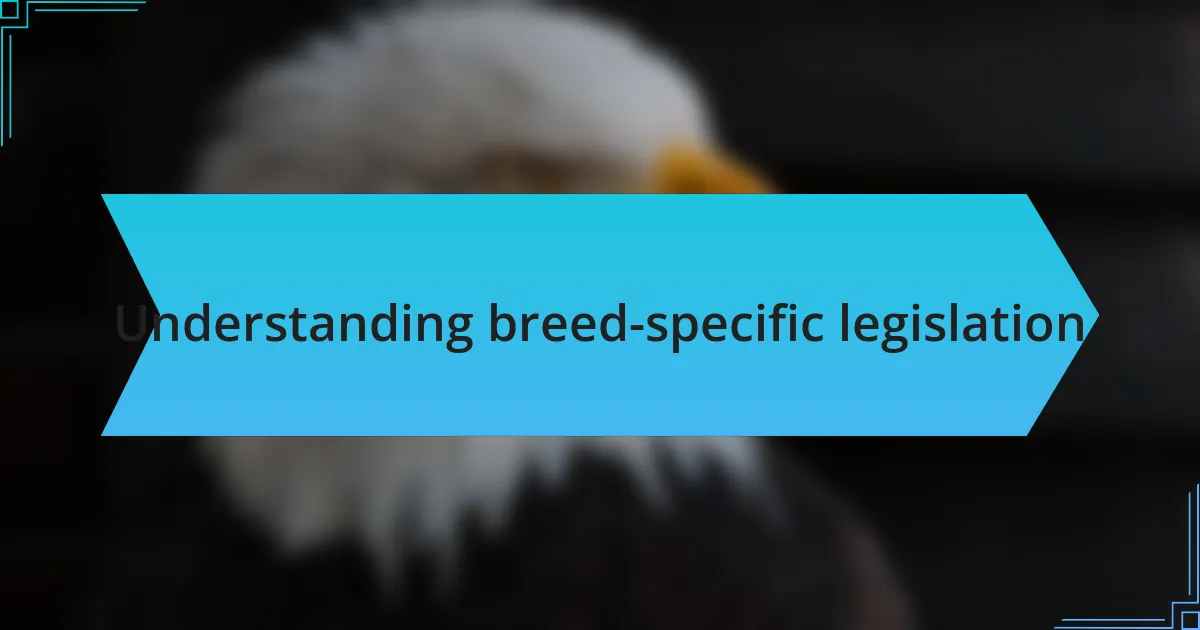
Understanding breed-specific legislation
Breed-specific legislation (BSL) refers to laws that restrict or ban certain dog breeds deemed dangerous or aggressive. I often find myself pondering the fairness of these laws; should we really judge a dog solely on its breed? In my experience, a dog’s behavior is much more about its upbringing and environment than its genetics.
I’ve met many pit bulls who are gentle and affectionate, defying the stereotypes that surround them. Remember the time I volunteered at a shelter and encountered a lovely Rottweiler named Max? He was a big sweetheart, but I couldn’t help but feel the weight of BSL hovering over his head, where he might be unfairly judged based on breed rather than his loving nature. How often do we let misconceptions cloud our judgment about these wonderful animals?
From a practical standpoint, BSL often fails to achieve its intended goal of enhancing public safety. I’ve realized that education about responsible pet ownership and training can lead to far better outcomes than banning specific breeds. What would happen if more communities focused on ensuring proper education and enforcement instead of relying solely on restrictive laws? It’s a question worth considering as we navigate the complexities of animal welfare and public safety.
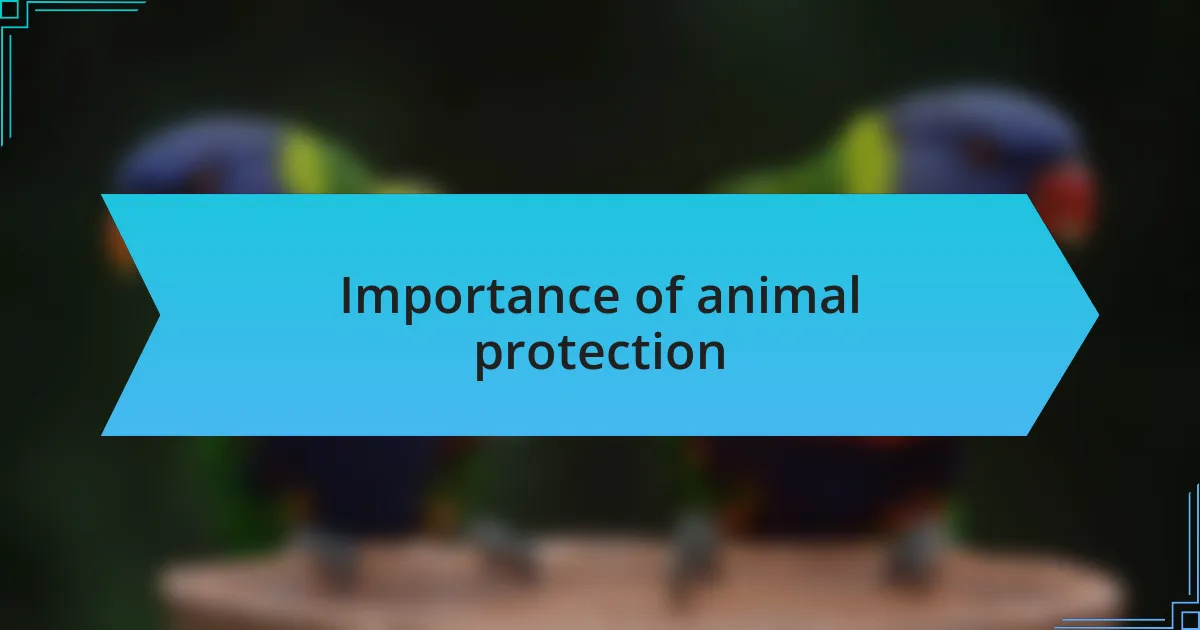
Importance of animal protection
Animal protection is crucial for fostering a society that values compassion and respect for all living beings. I’ve often reflected on how our treatment of animals reflects our humanity. If we neglect their welfare, what does that say about us as a community? They depend on us for their safety and well-being, and it’s our responsibility to advocate for their rights.
For instance, I remember attending a local event focused on animal rescue, where stories of neglected and abused animals were shared. Listening to survivors and their incredible journeys opened my eyes to the stark reality many face. It made me realize that protecting animals is not just about laws; it’s about safeguarding their voices and ensuring they receive the love they deserve.
Additionally, my experiences with rescue organizations have shown me how important it is to raise awareness. Educating the public about animal protection can help diminish the stigma surrounding certain breeds and encourage empathy towards all animals. When we actively engage in discussions about their rights, we foster a culture of responsibility that benefits not only the animals but also enriches our communities.
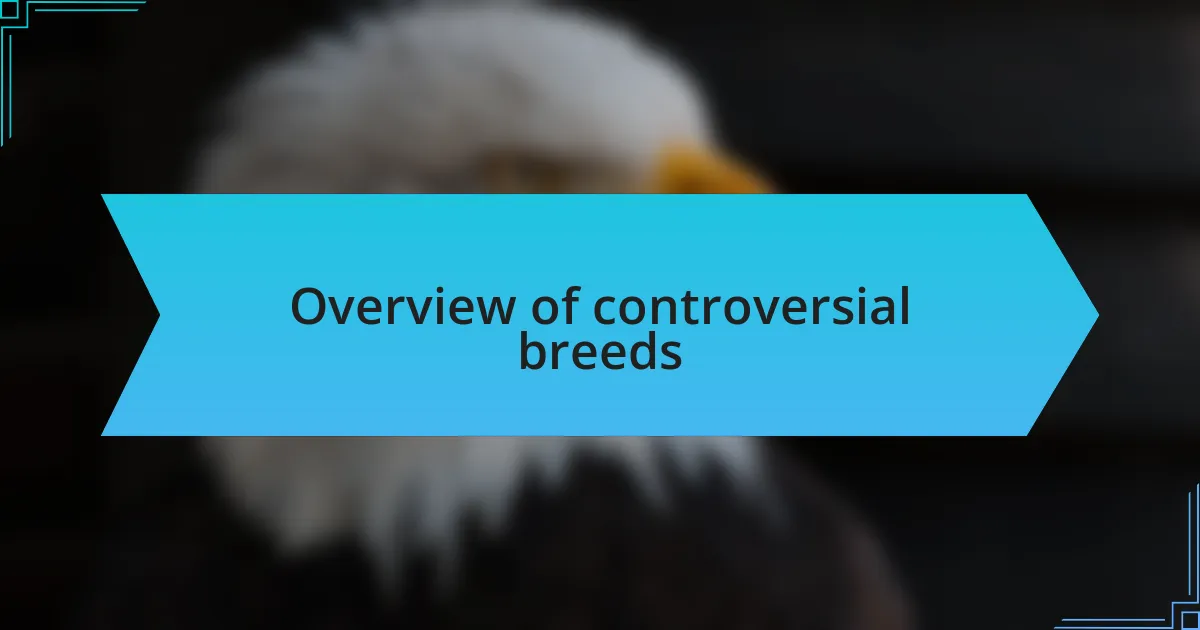
Overview of controversial breeds
Certain dog breeds often find themselves at the center of controversial discussions surrounding breed-specific legislation (BSL). Breeds such as Pit Bulls, Rottweilers, and Doberman Pinschers frequently get labeled as inherently dangerous, a classification I believe often overlooks individual behavior and responsible ownership. I remember a time in my neighborhood when a well-mannered Pit Bull would greet everyone joyfully, yet the mere mention of its breed sparked fear among some residents. This experience always made me wonder: should a dog’s breed determine its fate when the individual dog’s temperament is what truly matters?
The reality is that many of these breeds have loyal, loving dispositions when raised in supportive environments. I recall volunteering with a rescue organization that rehabilitated a Rottweiler who had been abandoned. Once given the chance, he proved to be not just friendly, but also incredibly protective of his new family. This reinforces my belief that breed stereotypes can be misleading, as the influence of training and socialization plays a vital role in a dog’s behavior.
Making blanket assumptions about these controversial breeds can impede our understanding of their true nature. As I’ve witnessed firsthand, countless dogs labeled as dangerous are often victims of social stigma rather than their own actions. So, isn’t it our responsibility to look deeper and recognize the complexities behind each individual dog? Addressing breed-specific issues requires a shift in perspective, advocating for policies that focus on responsible ownership rather than penalizing entire breeds.
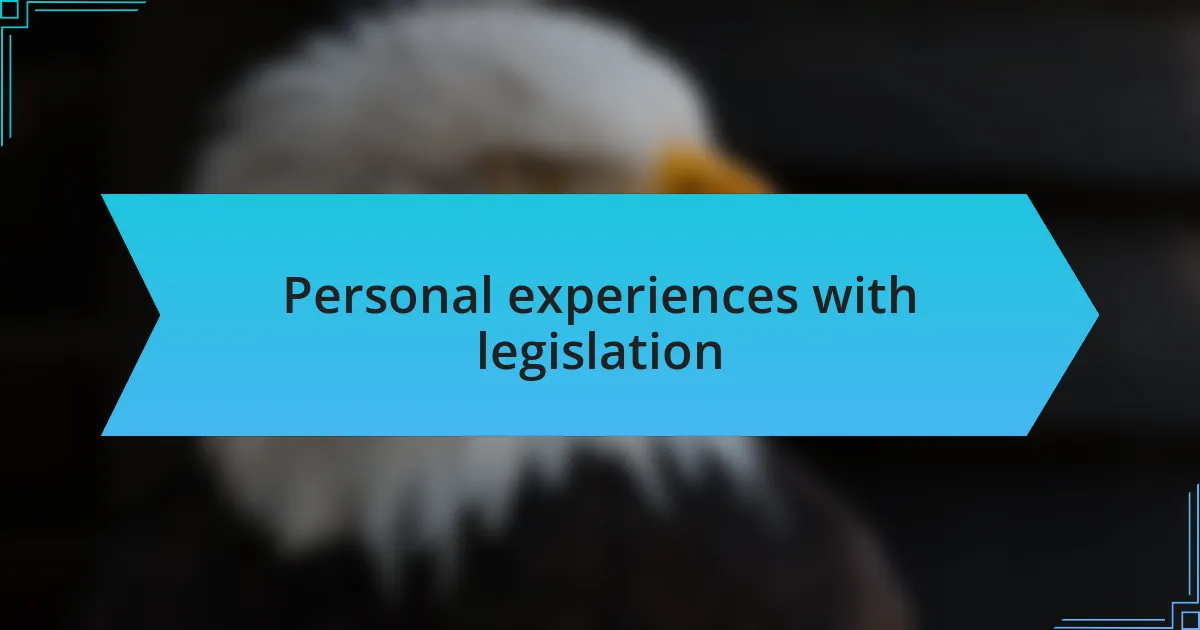
Personal experiences with legislation
I have encountered breed-specific legislation (BSL) firsthand while working in animal shelters. One day, I was tasked with caring for a beautiful Pit Bull named Max, who was incredibly gentle and adored by everyone who met him. Yet, when potential adopters learned about his breed, they often hesitated, their faces clouding with doubt. It made me question how a dog’s worth could be overshadowed by mere labels.
Reflecting back on these experiences, I remember attending a town hall meeting where the council discussed implementing stricter BSL. It was disheartening to see passionate advocates of responsible pet ownership drowned out by fear-based narratives. It struck me as unjust that the hard work of dedicated rescue volunteers was at risk of being undermined by misconceptions that failed to recognize the countless positive examples of breed behavior. Why does it seem easier to blame a breed than to address owner responsibility?
There was a moment when I found myself standing beside a young girl who had come to defend her Rottweiler, who was affectionately known as “Buddy.” She spoke so boldly about how he had saved her from loneliness and had become her best friend. That day, it dawned on me how deeply these laws affect not only the dogs but also the lives intertwined with them. Shouldn’t we be advocating for understanding instead of allowing fear to dictate policy?
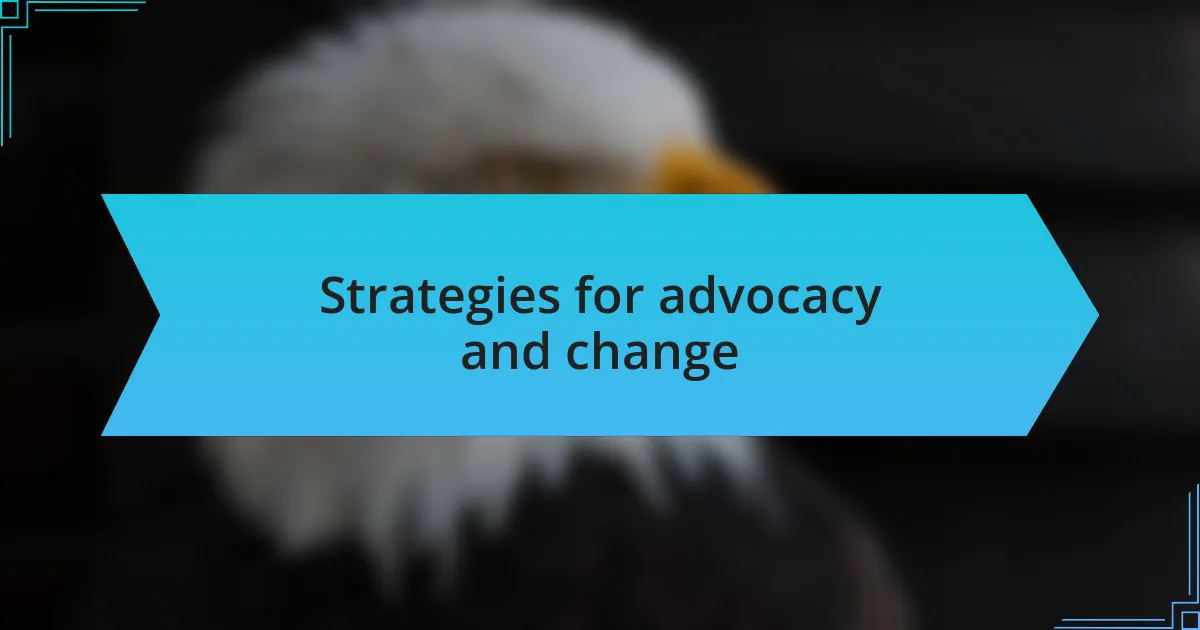
Strategies for advocacy and change
Engaging in advocacy against breed-specific legislation can be daunting, but I’ve found that building community support is crucial. I remember organizing a “Meet the Breeds” event at my local shelter, where we invited community members to interact with various breeds. It was heartwarming to see how personal connections formed, surprising many attendees who had previously held misconceptions. How can we change hearts and minds if we don’t provide opportunities for understanding?
Another effective strategy is harnessing social media to share stories of beloved dogs within targeted breeds. I once wrote a heartfelt post about a Doberman named Bella, who was a trained therapy dog. The reactions were incredible; people began sharing their own experiences and photographs, creating a sense of camaraderie that undermined negative stereotypes. Wouldn’t it be impactful if every breed had its own story to tell, showcasing their unique qualities?
Collaboration with veterinarians and trainers is also a powerful way to advocate for change. In one initiative, I partnered with a local trainer to hold workshops on responsible ownership and positive reinforcement techniques. When owners understand how to nurture good behavior, it builds confidence in their dogs and in the community. Isn’t it time we shift the narrative from breed blame to owner education?
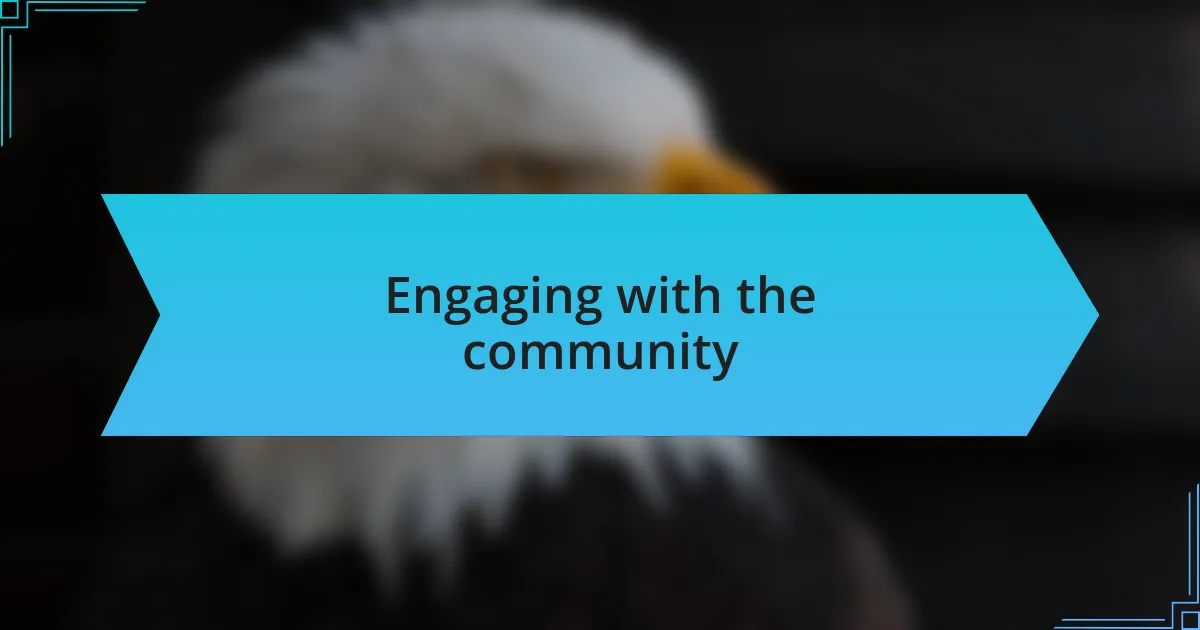
Engaging with the community
One of the most rewarding experiences I’ve had in engaging the community was when we launched a fundraising walk for pit bull rescue efforts. It was incredible to witness families, friends, and even those who were wary of the breed come together for a common cause. By turning skeptics into participants, we fostered dialogue about misconceptions while raising funds. Isn’t it amazing how shared experiences can melt away fear and build trust?
I recall chatting with a neighbor during a community meeting about breed-specific legislation, where I shared compelling stories of dogs in need of homes. Their initial apprehension turned into interest and empathy as I spoke about Tempi, a once-abandoned Rottweiler who now brings joy to countless children as a certified therapy dog. Have you ever seen the look on someone’s face when they finally understand? It’s a profound moment that emphasizes the power of storytelling in breaking down barriers.
Additionally, creating a support network among pet owners can transform the narrative surrounding specific breeds. I set up informal gatherings for dog owners to share tips and experiences, which not only empowered individuals but also sparked friendships that crossed breed lines. How often do we miss the opportunity to connect and learn from one another? By valuing every dog’s journey, we contribute to a more inclusive and understanding community.
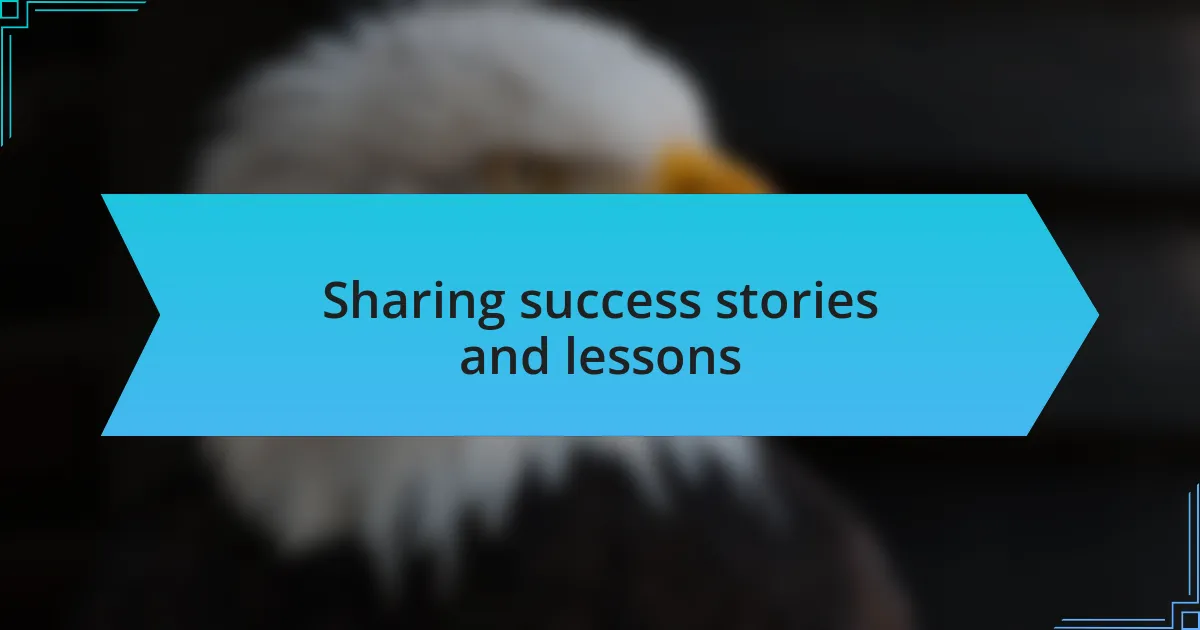
Sharing success stories and lessons
Sharing success stories can inspire communities to rethink breed-specific laws. I remember a local shelter that organized a “Meet the Breeds” event, allowing families to interact with misunderstood breeds like pit bulls and Dobermans. This hands-on exposure shifted perspectives dramatically; parents left the event with a renewed sense of openness and curiosity. How often do we let fear dictate our actions without really understanding the other side?
Through collaborative efforts, I witnessed firsthand the power of advocacy when a group of us petitioned for a local law to be revised. We gathered testimonials from families whose lives had been enriched by their pets, reading heartfelt stories that illustrated the unique bond between humans and dogs. Seeing the local council genuinely moved by our shared experiences gave me hope and reminded me of the significance of speaking up. How powerful can collective voices be in paving the way for change?
One particularly memorable success was a fostering program that connected families with dogs often overlooked due to breed biases. Each successful adoption was celebrated like a team victory, complete with stories shared on social media. The joy radiating from those families as they welcomed their new companions was unmistakable, proving that when we challenge misconceptions together, we can create a deeper understanding and appreciation for all breeds. Have you ever experienced the joy of watching someone fall in love with a breed they once feared? It’s a reminder of the transformative power of love and acceptance.